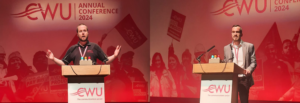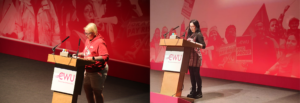Postal Conference 2024 – Day One
Postal, Union Matters April 23 2024
Preparing our negotiating agenda – fighting for fairness
Conference this afternoon approved a motion moved by DGSP Martin Walsh on behalf of the Postal Executive setting out some proposed draft negotiating priorities for the next round of national talks, which will cover the 2025/26 period and potentially beyond. Following its approval by Conference, he explained, the union plans to develop its detailed negotiating strategy through further consultations, including either a special conference or policy forum.
The bullet points listed on this motion cited importance of the USO situation and included the need to address the situation faced by new entrants, as well as pay, the shorter working week, overtime and scheduled attendance, job design, attendance patterns a review of the profit-share scheme and assessment of the financial state of the company. After this main motion was voted through, Conference also backed a further motion proposed by Ian Trehearne of Gloucester Amal Branch, which specifically addressed the new entrants’ issue.
New contracts of employment were introduced unilaterally by Royal Mail during the national dispute – contracts which significantly worsened new employees’ pay, terms and conditions – despite the opposition of the CWU. And anger at this was expressed by several speakers during this debate, with repeated calls for these workers to be levelled up as a matter of priority.

Billy Larkin and Owain Beaumont pictured above
Moving his motion, which called for contractual parity to be achieved within a specific timeframe, Ian Trehearne described the new entrants’ situation as “a massive pressing issue,” while South East Thames Amal delegate Billy Larkin, supporting the proposition, said: “We will fight to uplift them and not have a two-tier workforce.”
With several propositions making the same or similar points, other motions on the subject either fell ‘consequentially’ or were not approved because of a preference for the Gloucestershire Amal motion – but it was fair to say that the overall feelings of Conference were unanimous in terms of strong disagreement with the company’s treatment of new recruits.
Owain Beaumont of Scotland No2 Branch, for example, said: “We cannot allow a two-tier workforce any longer,” and added that, unless this issue is addressed as soon as possible “it will be regretted in the future,” while Glasgow & District Branch delegate John Carson said that the treatment of new starters was “an outrage” and accused management of “exploiting new members of staff.” Lee Wemban, from South London Postal & Counters Branch, read out some sentences from the new contracts and insisted: “We have to upgrade our new entrants’ terms and conditions” and Ros White of Highland Amal Branch said that the introduction of these new contracts was “morally appalling.”
Two important sessions this afternoon – one on pensions and the other on the Lord Falconer Report – were held on an ‘in-camera’ basis and therefore cannot be reported due to sensitivity and confidentiality issues.
Back in the workplace – reconnecting
Chair Mick Kavanagh had opened CWU Postal Conference 2024 this morning with a warm welcome to all and began by asking the hall to stand and applaud for a minute in respect of the late Jane Loftus and other members who have passed away since the last Postal Conference.
Mick then introduced deputy general secretary Martin Walsh for his first speech to this event since being elected as our DGSP and he started his address by paying tribute to his predecessor Terry Pullinger, and also to Andy Furey who stepped up as acting DGSP in late 2022.
Looking back at the 2022/23 national dispute and its aftermath, Martin thanked members again for their robust support throughout the 18 days of national strike action and reaffirmed that, in the circumstances, signing up to the Business Recovery, Transformation & Growth (BRTG) agreement was the right decision.
“That deal was the best option available,” he said, adding: “The only options were BRT&G, imposed change, or administration – and administration was a real possibility.”
Martin went onto explain that, had administration occurred, the Government would only have been legally obliged to protect USO work – which, he said, accounts for only 14 per cent of our members’ work. This would therefore have placed tens of thousands of postal workers’ jobs in dire jeopardy.
The challenge ahead is to reconnect with our members in every workplace in the UK, our DGSP continued, with a strong focus on recruiting non-CWU members into the union. Martin listed the range of key challenges facing the union at this time and updated delegates on where we are with these matters.
In closing, he made the point that, as we make progress on dealing with the range of key workplace issues across all functions of Royal Mail, we can rebuild now and into the future, but that unity is crucial.
“This union will only get the best results from change if we’re united,” he said and urged delegates: “Let’s use this conference to announce to Royal Mail, to shareholders, to the Government – and the Government-in-waiting – that the CWU is back in the workplace fighting for our members’ futures.”
“If we are united, we shall overcome.”
Royal Mail’s rollout of its new ‘My Performance’ app without the union’s agreement and ‘escalating problems with the general operation of HR’ provided the subject of the first motion of the day – an Emergency Motion from South Wales/South West Division. This proposition set out in some detail the sheer volume of the current problems impacting on members and called for an ‘urgent high-level summit meeting’ with Royal Mail’s senior national leadership to address and resolve these issues.
Moving the motion, South Wales/South West divisional representative Ralph Ferret described his “burning, furious anger” at the treatment of workers by the company injustices and sharply criticised the Royal Mail leadership. The role of the Human Resources (HR) department in this was highlighted in particular, with Ralph commenting wryly that the acronym ‘HR’ could now stand for ‘Headcount Reduction’.
“This motion is about trying to get a reset,” he said, adding: “There’s got to be accountability at every level.”
A dozen speakers came to the rostrum in support of the motion, including Simon Edmunds from Nottingham & District Branch, who insisted: “We’ve got to get accountability of these people,” while South East Thames Amal’s Billy Larkin said: “We need the truth – not a box-ticking exercise” and North Wales/North West divisional representative Paul Dugdale, who gave a moving contribution about a wrongly dismissed member who had recently died.
“Thankfully, we got justice for him before he passed away. But this kind of thing must never happen again,” said Paul.
Pat Carey, from London North/Northwest Branch, said: “We need a proper agreement,” Bournemouth & Dorset Amal delegate Ian Gray insisted: “We have to have a HR that’s fair to all” and Dave Banbury from Kent Invicta urged: “We need to send a clear message to the business.”
Supporting the motion on behalf of the Postal Executive, DGSP Martin Walsh said: “This is one of the areas which the BRT&G agreement refers to under the resetting of relationships. We’re meeting with Royal Mail after Conference and we’ll be aiming to progress this.”

Laura Snell and Louise James pictured above
The motion was approved by delegates, who then moved onto the scheduled agenda pad. This started with a proposition from Eastern No4 Branch, which was successfully moved by Laura Snell on the subject of mental health illness and the need for a specific set of guidelines on this to be established. Laura spoke movingly of some of her own experiences and also cited instances where it was felt that people’s mental health-related conditions had not been treated with sufficient respect. Steve Jones, speaking for the motion on behalf of the Postal Executive, agreed and empathised with the points made by Laura dn by others in the debate and added that there was a need for more workplace mental health first-aiders as well.
Other motions approved by delegates during a busy morning included a call for better support – in accordance with the Armed Forces Covenant – for former armed forces personnel working for Royal Mail who suffer from post-traumatic stress disorder (PTSD) and other military service-related trauma conditions. Moved by Mark Walsh of Greater Mersey Branch, this motion was also supported by Eastern Region secretary – and military veteran – Paul Moffatt, who told Conference that he suffered from PTSD himself.
“it’s one of the most debilitating conditions, because it’s all in your head,” he said, adding: “You go through a whole range of emotions, sadness, anger, or even shame. But just because we might have a wobble at work, it doesn’t mean we’re bad people.”
Conference also voted for a motion moved by South Yorkshire & District Amal Branch delegate Louise James, which instructed the Executive to work with Royal Mail to introduce a free temporary mail redirection service for anyone staying in a domestic abuse refuge. “I had this experience when I had to leave an abusive relationship with nothing,” she said, explaining that this service would be extremely important to others in that situation. Darren Glebocki replied to the debate on behalf of the Executive and reported that this matter was already being worked on with the business and that it had been and is being progressed.

